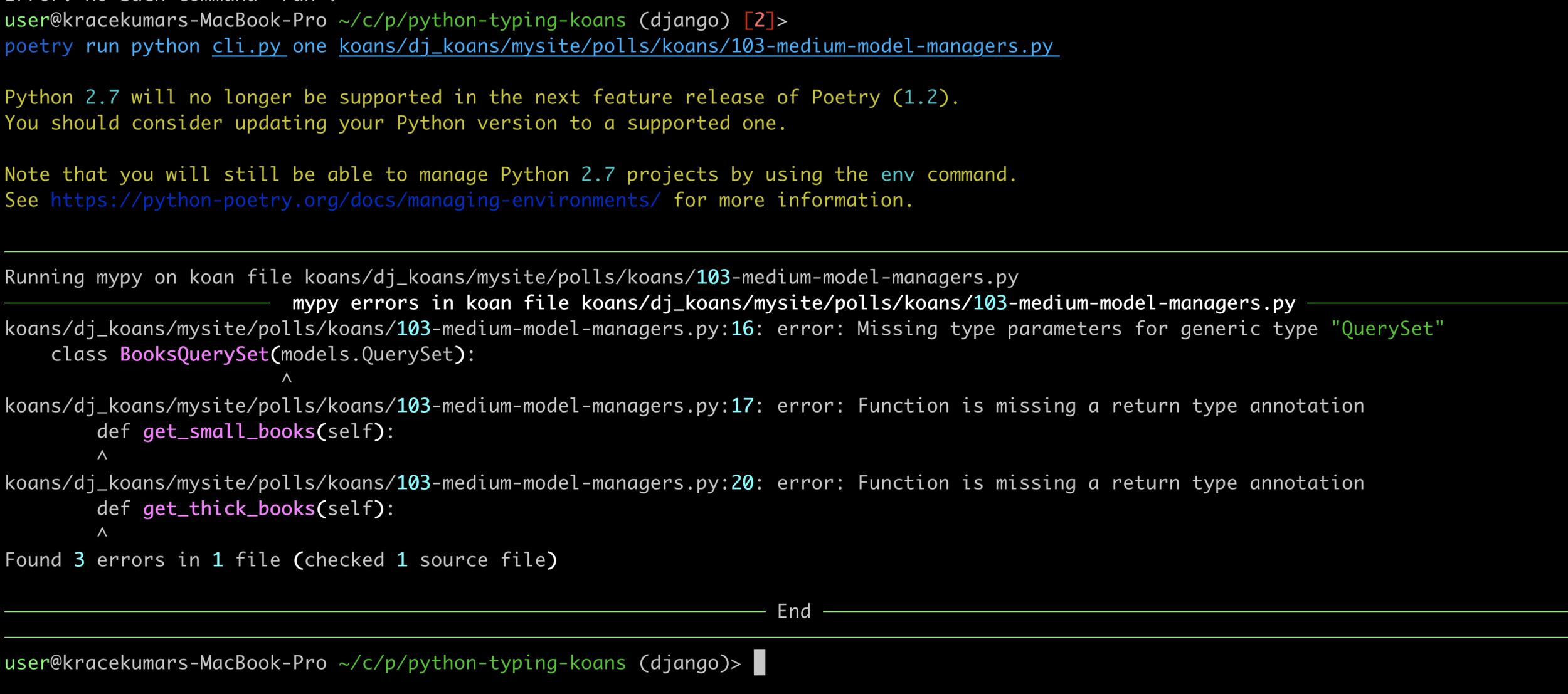Type Check Django App - PyCon India 2021
Who Am I?
Types at runtime
from django.contrib.auth.models import User
type(User.objects.filter(
email='foo@example.com'))
# output
django.db.models.query.QuerySet
type(("127.0.0.1", 8000))
# output
tupleStatic Checker Type
# filename.py
addr = "127.0.0.1"
port = 8000
reveal_type((addr, port))$mypy filename.py
note: Revealed type is
'Tuple[builtins.str, builtins.int]'# filename.py
from django.contrib.auth.models import User
reveal_type(User.objects.filter(
email='foo@example.com'))
$ mypy filename.py
note: Revealed type is
'django.contrib.auth.models.UserManager
[django.contrib.auth.models.User]'
mypy config
$cat mypy.ini
...
plugins =
mypy_django_plugin.main,
[mypy.plugins.django-stubs]
django_settings_module = "yourapp.settings"Annotation Syntax
Variable & Function
from datetime import date
lang: str = "Python"
year: date = date(1989, 2, 1)def sum(a: int, b: int) -> int:
return a + b
class Person:
def __init__(self, name: str, age: int,
is_alive: bool):
self.name = name
self.age = age
self.is_alive = is_aliveAnnotating Django Code
View
from django.http import (HttpRequest, HttpResponse,
HttpResponseNotFound)
def index(request: HttpRequest) -> HttpResponse:
return HttpResponse("hello world!")
def view_404(request:
HttpRequest) -> HttpResponseNotFound:
return HttpResponseNotFound(
'<h1>Page not found</h1>')
def view_404(request: HttpRequest) -> HttpResponse:
return HttpResponseNotFound(
'<h1>Page not found</h1>')
# bad - not precise and not useful
def view_404(request: HttpRequest) -> object:
return HttpResponseNotFound(
'<h1>Page not found</h1>')Method Resolution Order
HttpResponse.mro()
[django.http.response.HttpResponse,
django.http.response.HttpResponseBase,
object]
HttpResponseNotFound.mro()
[django.http.response.HttpResponseNotFound,
django.http.response.HttpResponse,
django.http.response.HttpResponseBase,
object]LSP
The LSP states
that in an object-oriented program,
substituting a superclass
object reference with an object
of any of its subclasses,
the program should not break.Django Models
Create
from django.db import models
from django.utils import timezone
class Question(models.Model):
question_text = models.CharField(max_length=200)
pub_date = models.DateTimeField("date published")
def create_question(question_text: str) -> Question:
qs = Question(question_text=question_text,
pub_date=timezone.now())
qs.save()
return qs
Read
def get_question(question_text: str) -> Question:
return Question.objects.filter(
question_text=question_text).first()error: Incompatible return value type
(got "Optional[Any]", expected "Question")from typing import Optional
def get_question(question_text: str) ->
Optional[Question]:
return Question.objects.filter(
question_text=question_text).first()
mypy config
# mypy.ini
strict_optional = False
def get_question(question_text: str) ->
Question:
return Question.objects.filter(
question_text=question_text).first()
Filter
Output
In [8]: Question.objects.all()
Out[8]: <QuerySet [<Question: Question object (1)>,
<Question: Question object (2)>]>
In [9]: Question.objects.filter()
Out[9]: <QuerySet [<Question: Question object (1)>,
<Question: Question object (2)>]>
def filter_question(text: str) ->
QuerySet[Question]:
return Question.objects.filter(
text__startswith=text)
def exclude_question(text: str) ->
QuerySet[Question]:
return Question.objects.exclude(
text__startswith=text)
all, reverse, none, complex_filter,
union, order_by, distinct,
defer, only, using, extra,
select_related, select_for_update,
prefetch_relatedMethods returning QuerySet
Aggregate
class Publisher(models.Model):
name = models.CharField(max_length=300)
class Book(models.Model):
name = models.CharField(max_length=300)
pages = models.IntegerField()
# use integer field in production
price = models.DecimalField(max_digits=10,
decimal_places=2)
rating = models.FloatField()
publisher = models.ForeignKey(Publisher)
pubdate = models.DateField()
Sample Output
def get_avg_price():
return Book.objects.all().aggregate(
avg_price=Avg("price"))
print(get_avg_price())
{'avg_price': Decimal('276.666666666667')}Annotated Code
from decimal import Decimal
def get_avg_price() -> dict[str, Decimal]:
return Book.objects.all().aggregate(
avg_price=Avg("price"))
Annotate Method
Count books by pubslisher
def count_by_publisher():
return Publisher.objects.annotate(
num_books=Count("book").values(
'name', 'num_books'))
Result
In [17]: [i for i in count_by_publisher()]
Out[17]: [{'name': 'Penguin', 'num_books': 2},
{'name': 'vintage', 'num_books': 1}]
Returning QuerySet
def count_by_publisher():
return Publisher.objects.annotate(
num_books=Count("book"))
def print_pub(num_books=0):
if num_books > 0:
res = count_by_publisher().filter(
num_books__gt=num_books)
else:
res = count_by_publisher()
for item in res:
print(item.name, item.num_books)
Example Output
In [42]: print_pub()
Penguin 2
vintage 1
Annotation
from typing import TypedDict
from collections.abc import Iterable
class PublishedBookCount(TypedDict):
name: str
num_books: int
def count_by_publisher() ->
Iterable[PublishedBookCount]:
...Error
# mypy output
scratch.py:46: error: Incompatible return value
type (got "QuerySet[Any]", expected
"Iterable[PublishedBookCount]")
return Publisher.objects.annotate(
num_books=Count("book"))
^
scratch.py:51: error:
"Iterable[PublishedBookCount]" has no attribute "filter"
res = count_by_publisher().filter(
num_books__gt=num_books)QuerySet
def count_by_publisher() -> QuerySet[Publisher]:
...
def print_pub(num_books: int=0) -> None:
...
for item in res:
print(item.name, item.num_books)# mypy output
scratch.py:55: error: "Publisher" has
no attribute "num_books"
print(item.name, item.num_books)Hack!
from typing import TYPE_CHECKING
if TYPE_CHECKING:
class TypedPublisher(Publisher):
num_books = models.IntegerField()
class meta:
abstract = True
def count_by_publisher() -> QuerySet[TypedPublisher]:
return Publisher.objects.annotate(
num_books=Count("book"))
def print_pub(num_books: int=0) -> None:
if num_books > 0:
res = count_by_publisher().filter(
num_books__gt=num_books)
else:
res = count_by_publisher()
for item in res:
print(item.name, item.num_books)
Tools
pyannotate
Pyannotate
- Automatically insert type-hints into the code
- pytest-annotate infer type from test cases
Source Code
from django.http import (HttpResponse,
HttpResponseNotFound)
# Create your views here.
# annotate the return value
def index(request):
return HttpResponse("hello world!")
def view_404_0(request):
return HttpResponseNotFound(
'<h1>Page not found</h1>')
Test Code
from polls.views import *
from django.test import RequestFactory
def test_index():
request_factory = RequestFactory()
request = request_factory.post('/index')
index(request)
def test_view_404_0():
request_factory = RequestFactory()
request = request_factory.post('/404')
view_404_0(request)Run test command
$DJANGO_SETTINGS_MODULE="mysite.settings"
PYTHONPATH='.' poetry run pytest
-sv polls/tests.py
--annotate-output=./annotations.json$cat annotations.json
[...
{
"path": "polls/views.py",
"line": 7,
"func_name": "index",
"type_comments": [
"(django.core.handlers.wsgi.WSGIRequest) ->
django.http.response.HttpResponse"
],
"samples": 1
},
{
"path": "polls/views.py",
"line": 10,
"func_name": "view_404_0",
"type_comments": [
"(django.core.handlers.wsgi.WSGIRequest) ->
django.http.response.HttpResponseNotFound"
],
"samples": 1
}
]Apply the changes
$poetry run pyannotate --type-info
./annotations.json
-w polls/views.py --py3from django.http import HttpResponse, HttpResponseNotFound
from django.core.handlers.wsgi import WSGIRequest
from django.http.response import HttpResponse
from django.http.response import HttpResponseNotFound
def index(request: WSGIRequest) -> HttpResponse:
return HttpResponse("hello world!")
def view_404_0(request: WSGIRequest) ->
HttpResponseNotFound:
return HttpResponseNotFound(
'<h1>Page not found</h1>')
Auto-modified file
Learning Resource
Python Typing Koans

Thank you!
Twitter: @kracetheking
Github: kracekumar
Email: me@kracekumar.com

